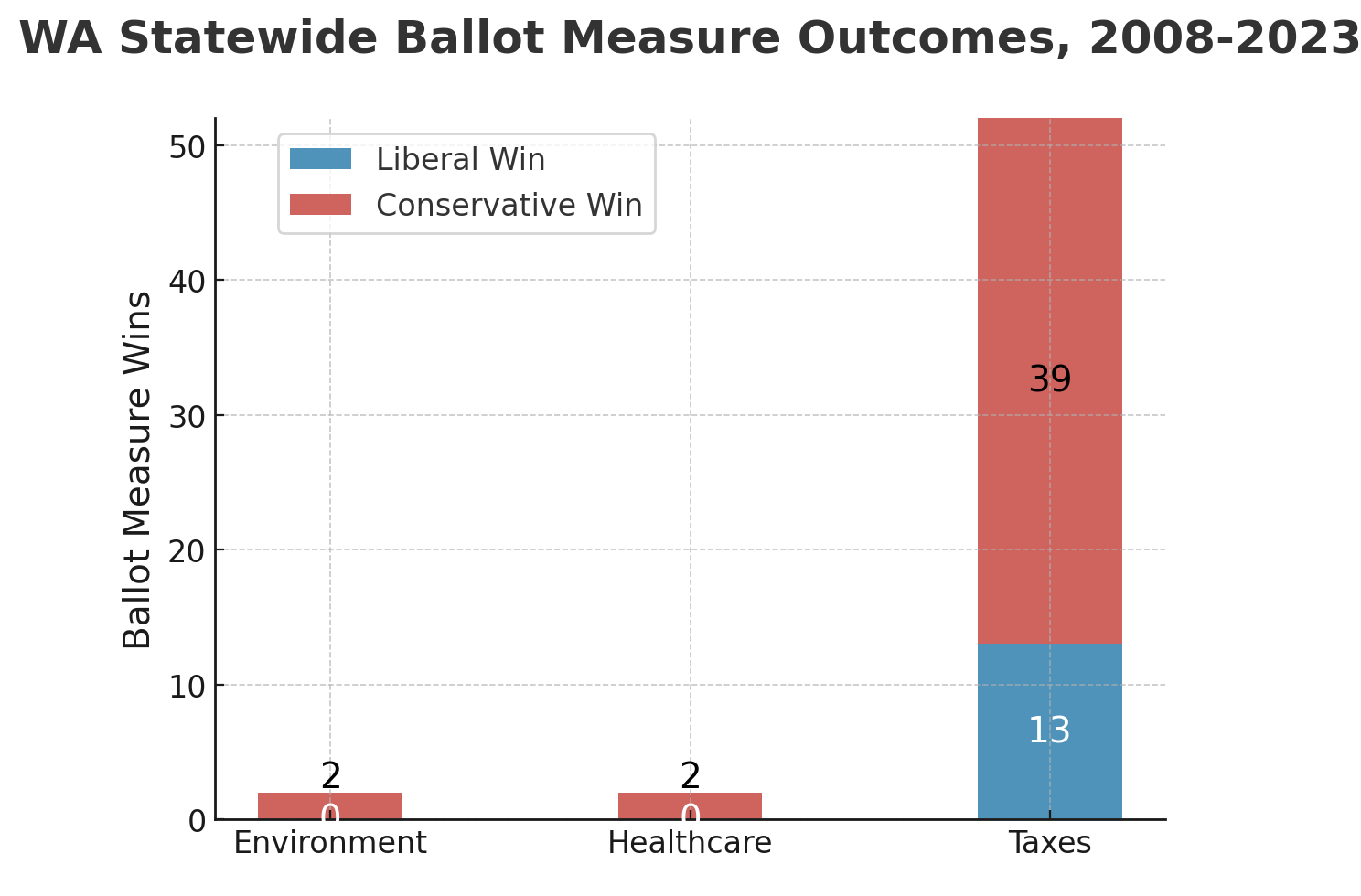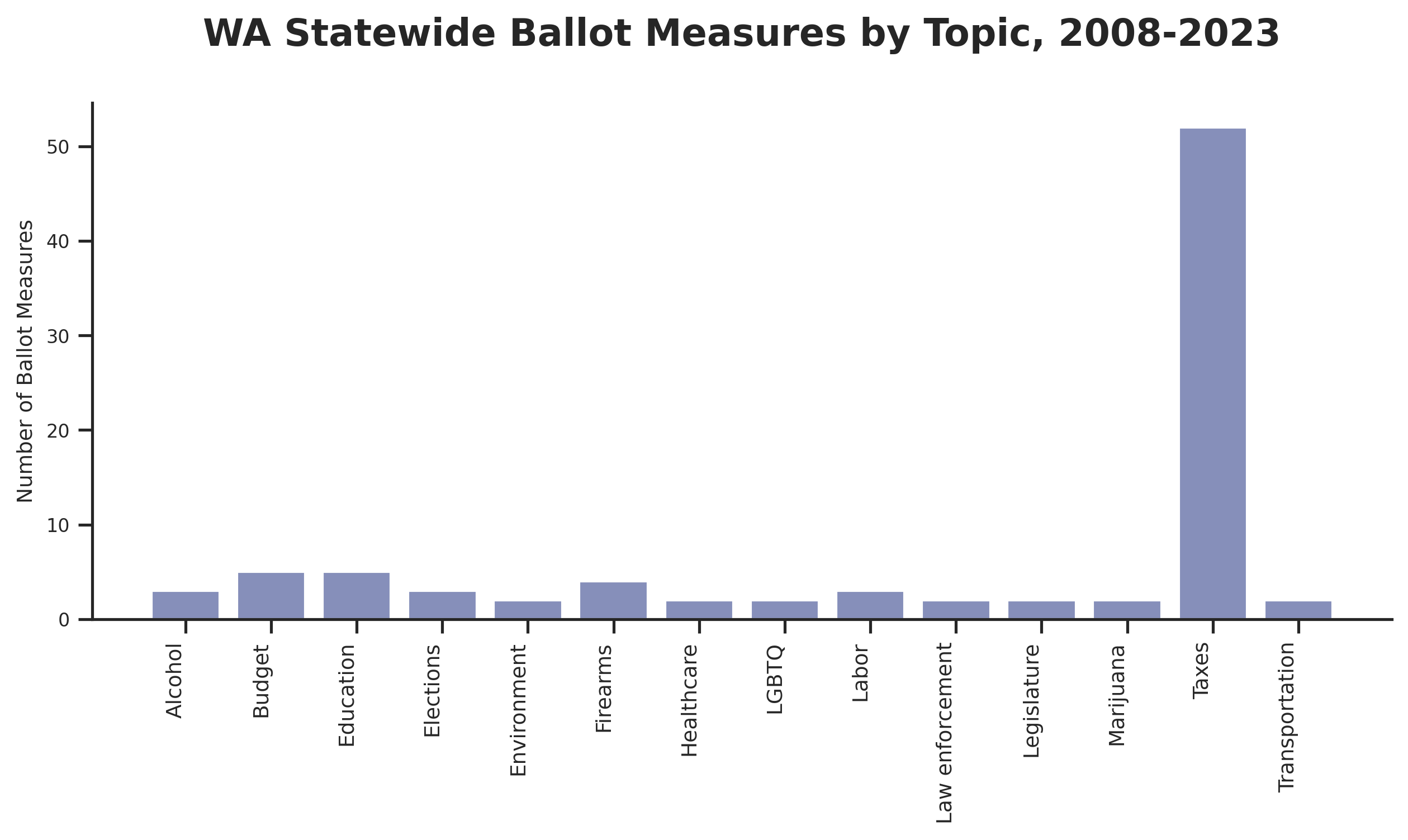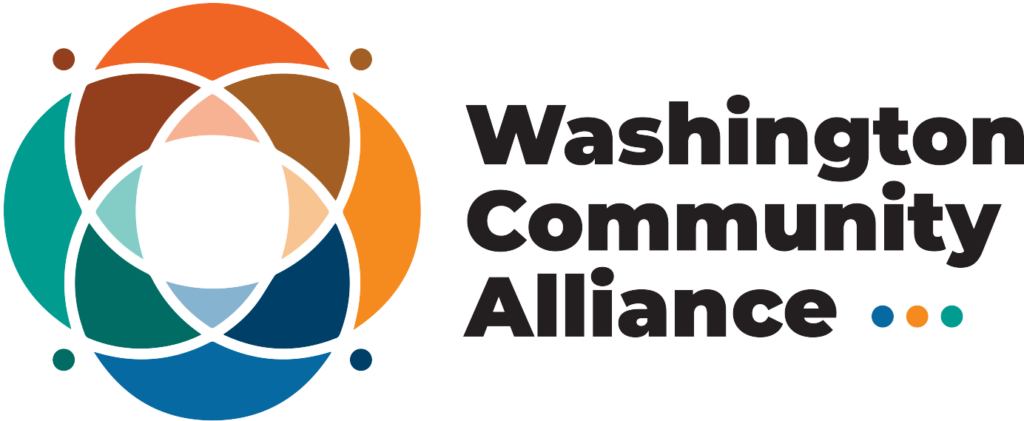
By Andrew Hong, WCA Action Fund
What is a Ballot Measure?
Ballot measures are policy proposals that the people — instead of the politicians — directly vote on. For example, Washingtonians voted on whether to legalize same-sex marriage in 2012 (a majority voted to legalize it). There are two main buckets of state ballot measures: referendums and initiatives. Referendums veto a specific bill passed by the State Legislature while initiatives can be about any topic regardless of what the Legislature did. Both require enough signatures from Washington citizens to appear on the ballot, and both require a majority of voters to pass into law.
Why Care about Ballot Measures?
Firstly, they dictate law, and laws dictate your life. However, ballot measures can also impact other races, too. An analysis by WCA Data Hub on ballot measures nationwide showed that the presence of initiatives on the ballot increased turnout, mostly in metropolitan areas and among low-turnout groups like young people and people of color.
Looking at 2024, turnout could increase from 2020 because of ballot measures. In 2020, there was only 1 measure that had about $2 million spent from either side. In 2024, there are 4 measures that collectively garnered nearly $70 million (as of October 16) and counting. The influx of ballot measure cash could spur turnout.
What are the Ballot Measures in 2024?
Republicans are spending so much (over $50 million and counting) on ballot measures because they have given up on winning elections to legislate. Instead, they’re legislating by spending tens of millions of dollars on ads for ballot measures that undo progress Washington has made on fair taxation, childcare, climate change, healthcare, and more.
They started with several prospective ballot measures, but were only able to garner sufficient support for these 4 measures:
| Description | |
| I-2066 | Bans any regulation on natural gas use |
| I-2109 | Repeals tax on capital gains >$250,000/year to fund social programs |
| I-2117 | Ends cap-and-invest program to reduce carbon emissions |
| I-2124 | Removes mandate to state long-term health insurance program |
Who Supports vs Opposes 2024 Ballot Measures
| “Yes” (Supports) |
|
| “No” (Opposes) |
|
| It’s complicated |
|
Polling on 2024 Ballot Measures
| October | September | May | |
| 2066: Deregulate Natural Gas | Yes +13% | Yes +18% | N/A |
| 2109: Repeal Capital Gains | No +28% | No +22% | Yes +10% |
| 2117: Repeal Cap & Invest | No +18% | No +16% | Yes +10% |
| 2124: Remove Healthcare Mandate | No +21% | Yes +6% | Yes +22% |
Fundraising for 2024 Ballot Measures
| Yes | No | |
| 2066: Deregulate Natural Gas | $13.3M | $0.1M |
| 2109: Repeal Capital Gains Tax | $13.0M | $3.2M |
| 2117: Repeal Cap & Invest Program | $13.0M | $11.7M |
| 2124: Remove Healthcare Mandate | $13.0M | $0.7M |
Similar Historic Ballot Measures
We can also use historic ballot measures on similar topics to predict how voters will vote on this year’s measures. Three of the four ballot measures (2109, 2117, 2124) are about taxes; two relate to the environment (2117, 2066); and 2124 addresses healthcare.
Since 2008, there have been nearly 100 ballot measures. The majority (52) were on taxes, mainly from mandated (until 2023) advisory questions on every tax change made by the State Legislature. There have been only 2 environmental and 2 healthcare measures.
 Across the environment, healthcare, and taxes, Washingtonians have generally voted against the liberal position. The liberal side won 0/2 on environment, 0/2 on healthcare, and 13/52 on taxes since 2008. Conservatives won even more citizen-led initiatives (excluding advisory votes) on taxes (91%). This bodes well for the “Yes” sides on the four 2024 measures. Perhaps, the conservative strategists picked these topics intentionally because Washingtonians tend to vote conservative on healthcare, tax, and the environmental ballot measures.
Across the environment, healthcare, and taxes, Washingtonians have generally voted against the liberal position. The liberal side won 0/2 on environment, 0/2 on healthcare, and 13/52 on taxes since 2008. Conservatives won even more citizen-led initiatives (excluding advisory votes) on taxes (91%). This bodes well for the “Yes” sides on the four 2024 measures. Perhaps, the conservative strategists picked these topics intentionally because Washingtonians tend to vote conservative on healthcare, tax, and the environmental ballot measures.
Summary
Overall, it is unlikely that all four measures will pass and unlikely that all will fail. Conservatives have electoral history and money on their side, but polling shows conservatives lead just 2/4 measures and only one by double-digits.
- I-2066 (deregulate natural gas) is favored to pass because the “Yes” side outspent “No” 133-to-1 and polling favors “Yes” by double-digits. Washingtonians have also sided with conservatives (Team “Yes”) on every environmental measure since 2008.
- I-2109 (repeal capital gains tax) is favored to fail because polling favors “No” by double-digits. While tax initiative results tend to swing conservative, this initiative could be different because the tax affects very few Washingtonians. Additionally, conservatives have a smaller fundraising advantage here.
- I-2117 (repeal cap-and-invest) is favored to fail even though environmental measures tend to swing right-wing, the liberal “No” campaign is well-funded and is ahead in polling by double-digits. All signals from this year point to a “No” victory.
- I-2124 (repeal healthcare mandate) is very close because the “Yes” side outspent “No” 19-to-1 and Washingtonians have voted against this healthcare measure and others before. However polling shows a single-digit race, making it the closest ballot measure of the four.
Note on Advisory Votes: Before 2023, there were non-binding state advisory votes on changes to tax law. However these advisory votes were non-binding — it doesn’t impact laws — and automatically placed on the ballot — no signatures required. These costly and, ultimately, meaningless, advisory votes stopped in 2023 after the Legislature removed them.
For those seeking more detailed information and real-time updates, the Washington Community Alliance Data Hub (https://wacommunityalliance.org/datahub/) provides accessible research, technical assistance, and strategic coordination to support civic engagement and promote high-participation elections across Washington State. Check out our Early Vote Dashboard for real-time updates on WA State voter turnout and our General Elections Dashboard which will be updated daily post election day with results.


